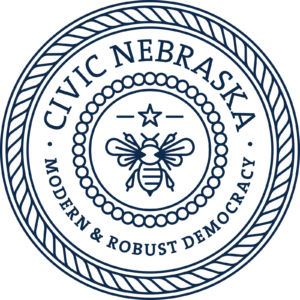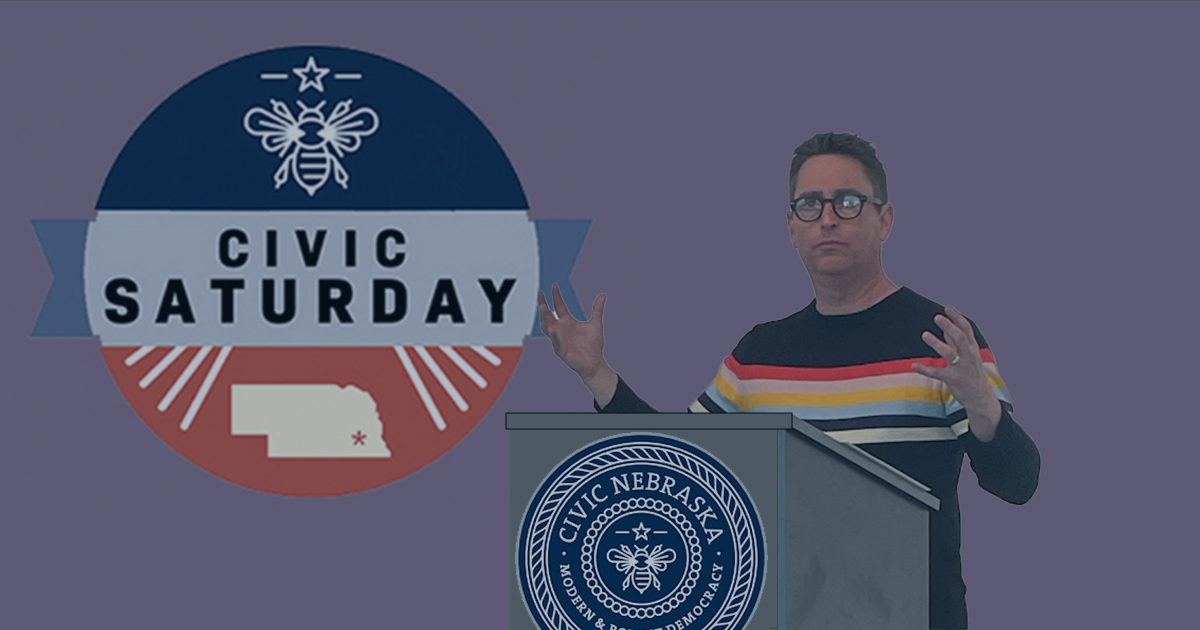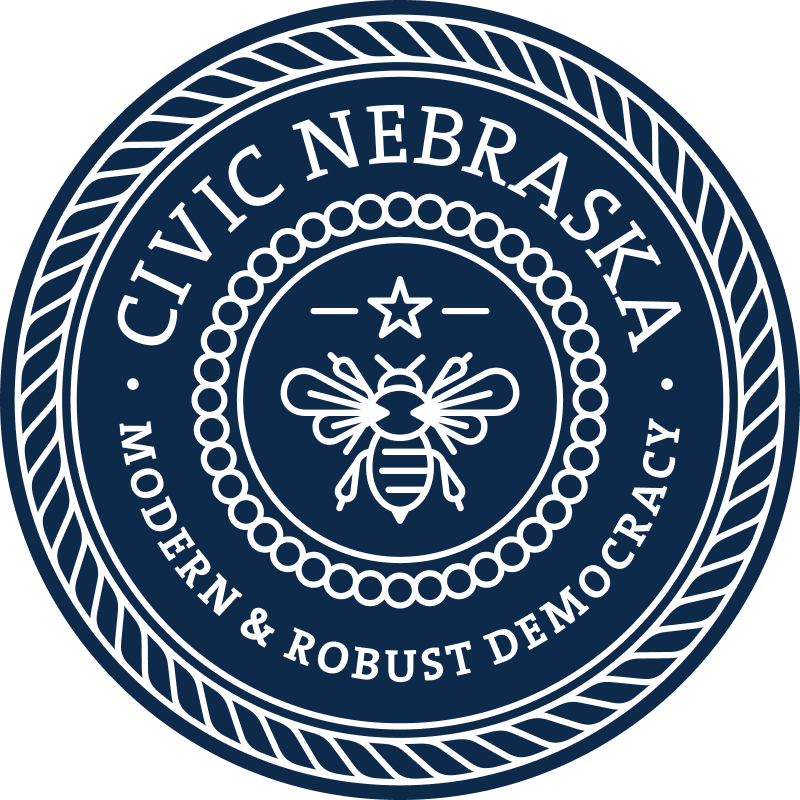On Dec. 9, 2023, Civic Nebraska convened Civic Saturday at Turbine Flats in Lincoln. National Civic Saturday Fellow Steve Smith delivered the following sermon, entitled “Loud & Clear.” Here it is in its entirety. To listen to the audio of the full Civic Saturday gathering, click here.
First off, thank you for coming out today. I know that doing something like this, for ourselves, is not easy this time of year. The holiday rush is real. I’m especially grateful to be right here and right now with all of you – because that means we are all safe, and none of us are presently battling for our lives in that parking lot at SouthPointe between Trader Joe’s and Scheels. This time of year, that’s about as close to The Hunger Games as it gets in Lincoln.
It’s funny. Here we are, in the season of hope, peace, and joy. Yet, we’re just as likely to feel stress, anxiety, and worry. Feels inevitable. Each day that we get closer to December 25th, the noise gets louder and louder – and so it’s easy to get anxious, or depressed. Or panicked, depending on the status of our shopping lists. It can be a lot to deal with.
But if you think about it, this disquiet we tend to feel before the holidays is kind of how we feel, year-round, in modern-day America. For lots and lots of reasons, these days, worry and fear are our base settings.
 It’s not surprising. We’ve been through a lot in 20 years. Terrorist attacks, two wars, the worst economic crisis since the Great Depression. Impeachments, insurrections, and indictments. A pandemic that took a million of us, and wrecked millions more.
It’s not surprising. We’ve been through a lot in 20 years. Terrorist attacks, two wars, the worst economic crisis since the Great Depression. Impeachments, insurrections, and indictments. A pandemic that took a million of us, and wrecked millions more.
Any of those things would be the defining moment of any era in modern history, but we’ve been through them all in two decades.
Now imagine, as all of these once-in-a-century challenges were happening, this powerful new way to communicate came to be. A way for everyone to have their own virtual printing presses. And then, before we knew it, they took control of what information we see – and equally as important, what information we do not see.
We live in a digital world. Which makes what we’re doing here today so extraordinary. We don’t meet anymore – we quote-unquote “engage.” And by “Engage,” I mean “get into fights on the Internet.”
So here we are, also preparing to hold a national election. You don’t have to be psychic to recognize that 2024 is going to be the loudest, messiest election in modern history. I’ll admit that I’ve been dreading the thought of what’s about to come for more than a year.
Strangely, my worry hasn’t stopped time. In three weeks, the calendar flips over. In five weeks, we’ll have the nation’s first presidential nominating contest, right across the Missouri River.
The volume is already cranked up. This is a good day to talk about it. Let’s talk about this noise.
First, let’s look at how far back it’s been around. Second, let’s look at what it can do to us if we let it. And finally, let’s discuss what we can do to deal with it.
OK. Here’s some speed history.
The year was 1770. A New England lawyer by the name of John Adams was given the unpopular task of representing nine British soldiers accused in the Boston Massacre. Given Adams’ sympathies for the colonial cause, it would have been easy enough for him to just phone this one in.
But he didn’t. Instead, he mounted a spirited defense of the Redcoats, and he won the case. During his closing arguments, Adams uttered some famous words about the nature of evidence. Does anyone know the phrase?
Yes. He said, “Facts are stubborn things.”
Facts are stubborn things. This is a universal truth. And it’s one that early Americans leaned on during the conflicts and debates in the pivotal years that followed. As Enlightenment thinkers, Adams and his fellow Founders stood with facts, evidence, and reason.
This also came in handy after the Constitution was put to the states for ratification. The anti-Federalists liked to point out that in the history of the world, there never had been a republic so geographically huge. How were 13 states covering some 1,500 miles possibly going to stay together?
Do you know the Federalists’ answer? Newspapers! Newspapers would protect and sustain the new nation. Citizens of the brand-new United States could get the same information up and down the continent within a few days – thus creating that informed populace you need to be a self-governing nation.
Well, there’s theory, of course, and then there’s practice. Many newspapers of the day were so fiercely partisan, they made Fox News and MSNBC look like the Disney Channel. They also played fast and loose with the facts – their pages were full of rumors, gossip, and baseless personal attacks. They were more National Enquirer than National Review.
And yet, we could learn a thing or two from early American news consumers. Picking up this periodical or that periodical, they knew exactly what they were getting into. They knew that if a hyper-partisan newspaper made them feel right in that wink-wink, nudge-nudge sort of way – facts be damned – then they were getting their money’s worth.
I bring this up for two reasons. First, none of what we’re dealing with today – disinformation that inflames and divides us – none of it suddenly started in 2016. Knowing that all this has happened in some way-shape-or-form before, can and should give us a sense of historical agency.
Second, it’s a reminder that we are not descended from gullible people. From those 18th-century patriots who knew the Stamp Act was rotten, to the 20th-century leaders who made “Trust, But Verify” a cornerstone of American foreign policy, we’ve always had a healthy skepticism in our American DNA.
But also – also – our brand of skepticism comes with a special twist: It’s infused with that trademark American optimism. This interplay between wariness and trust, between skepticism and optimism, has built us into resilient, savvy, results-oriented people. It’s led to many of our country’s greatest advances over the centuries. And, it has helped to keep us free.
Those were unprecedented times. Some say these are, too.
Somewhere along the way, digital technology changed us. Our tendency to trust has been betrayed by the almighty algorithms. That’s prompted us, in so many ways, to overcorrect in the other direction – from healthy skepticism right to a reflexive … cynicism. And that’s a decidedly un-American way of thinking.
Yes, facts are still stubborn things. But now we have the power to downvote them on YouTube. Or “Dislike” them on Facebook. Or “Mute” them altogether. Worse, it’s now effortless to connect with others in similar denial. We mutually reinforce our bad thinking in endless networks of disreality.
Is it any wonder, then, that we often feel the way we do? Is it any wonder that we can’t come together for much of anything anymore (Husker volleyball excluded)? I mean, how can we begin to debate a unified national response to climate change, a crumbling infrastructure, or housing affordability if we can’t even settle on a simple set of shared facts?
This is what happens in a world overwhelmed with noise. The signal is lost.
What happens next is all too predictable: Hard divisions form – between those who shape their opinions based on facts, and those who shape their facts based on opinions. News becomes spectacle, reasoned reaction becomes manufactured outrage.
It would be easy to blame the legacy media, which amplifies the worst of the digital world. It would be easy to blame Mark Zuckerberg for manipulating our information flow. But in the end, the failure is ours, and ours alone.
For all of the focus on what the Russians did or didn’t do in 2016, we have yet to reckon with how we Americans – all of us, collectively, Rs and Ds – have become such easy marks. So susceptible to manipulation and lies about our democratic institutions. So easily baited into dividing along religious, ethnic, or partisan lines.
All in service of feeling right – even if our facts don’t add up.
So, OK, that’s the problem. How do we focus on the signal?
Well, that’s the 270-electoral-vote question, isn’t it? Experts often hold up a concept called “media literacy” as a way out of this world of angst and distrust that we’ve all fallen into. And gee, all that is required is to vet every headline, every photograph, every video, and every claim we see, for accuracy, authenticity, and bias. In a digital world that is expanding by millions and millions of terabytes every day.
Yeah. That’s why most of us just roll the dice and let the algorithms do the work.
Show of hands: Who sincerely thinks that in the months and years ahead, we’ll have fewer sources of information competing for our attention?
(No hands go up)
Again, show of hands: How many of us think all of these news sources will be measured and moderate and faithful to facts?
(No hands go up)
 (Laughs) No, in a way, this is good news, friends. We all just demonstrated that we can still summon some of that skeptical optimism that I mentioned earlier. The same stuff our forefathers used to forge, to build, and to grow our nation.
(Laughs) No, in a way, this is good news, friends. We all just demonstrated that we can still summon some of that skeptical optimism that I mentioned earlier. The same stuff our forefathers used to forge, to build, and to grow our nation.
We Americans have a long tradition of seeing the obstacles before us and, rather than becoming perturbed and defeated, we turn them around to our advantage. Some might credit this to “hard work” or “the power of positive thinking” – but it’s more innate than that, isn’t it? It’s that dyed-in-the-wool American power to choose our response to any given situation. It’s that age-old American tradition of solving problems, not just reacting to them.
It’s time to summon this powerful American trait once more. Even in a world with trillions and trillions more data points to reckon with than our ancestors did. Because the principal battle in 2024 won’t be out here (waves arms), but in here (points to side of head). We can’t influence external events if we can’t master our internal worlds. It’s where our every feeling, opinion, and sensibility starts and ends. And it’s our best and only defense against the noise.
This is not a new notion. The ancient philosophers often referred to a strong, disciplined mind as our “Inner Citadel.” It’s a mental framework that protects us from BS, gives us peace, and sustains our vigilance. It’s a mindset built on facts, evidence, and reason.
It may not feel like it, but the fact of the matter is that we’re in control, not the noisemakers. No law says we have to seek out, absorb, repeatedly react to, and contribute to the sound and fury flashing across our screens.
We’re in control. We have the tools to hold onto the signal. If we are properly minding our internal citadels, then we have nothing to fear from all the noise. We’ll simply see it for what it is. We’ll learn and grow from it. And we’ll come out stronger, wiser, and freer than before.
Media, pundits, and politicians get their power from making us feel like our world, our very way of life is on the verge of inevitable collapse. They are very, very loud. Our minds must match them by being very, very clear – and to send a return signal to these forces of discord, those people who would casually throw away our democracy for more money, more fame, more power and influence.
Together, our signal can say that we reject division and anger. That we believe in the things America was built on, things like pluralism, tolerance, and – yes – civic love. And in the face of danger, our signal can say that this great American experiment, this thing of ours, is not going to end – not here, not now, and not on our watch.
This signal can guide us, all of us, as we join up to begin the work of remaking America, again.
That is what we are called to do.
Facts are stubborn things. And so is our American resolve – thank goodness. Let’s carry it with us when we leave here today. And tomorrow. And in the months and, yes, years to come.
We have the power. It’s time to use it.
Thank you.
![]()


